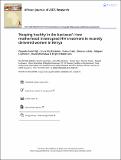| dc.contributor.author | Awiti-Ujiji, Opondo | |
| dc.contributor.author | Ekström, Anna Mia | |
| dc.contributor.author | Ilako, Festus | |
| dc.contributor.author | Indalo, Dorcas | |
| dc.contributor.author | Lukhwaro, Abigael | |
| dc.contributor.author | Wamalwa, David | |
| dc.contributor.author | Rubenson, Birgitta | |
| dc.date.accessioned | 2021-09-01T08:43:21Z | |
| dc.date.available | 2021-09-01T08:43:21Z | |
| dc.date.issued | 6/22/2011 | |
| dc.identifier.citation | Opondo Awiti-Ujiji , Anna Mia Ekström , Festus Ilako , Dorcas Indalo , Abigael Lukhwaro , David Wamalwa & Birgitta Rubenson (2011) ‘Keeping healthy in the backseat’: How motherhood interrupted HIV treatment in recently delivered women in Kenya, African Journal of AIDS Research, 10:2, 157-163, DOI: 10.2989/16085906.2011.593378 | en_US |
| dc.identifier.issn | 1608-5906 (Print) | |
| dc.identifier.issn | 1727-9445 (Online) | |
| dc.identifier.uri | http://repository.amref.org/handle/123456789/197 | |
| dc.description.abstract | Although there is a large body of literature related to the experiences of motherhood and aspects of the change
that it brings about, how the experience of motherhood affects the healthcare of women with chronic illness is less
documented. This study explores how motherhood in newly delivered HIV-infected mothers in Kenya interrupted
their antiretroviral treatment (ART). Qualitative interviews were performed with 26 mothers on ART in a rural or
urban area. The data were organised and interpreted using content analysis. The study found that adherence to
ART was influenced by contextual differences in socio-cultural expectations and family relationships. Urban life
enabled women to make decisions on their own and to negotiate challenges that were often unpredictable. Women
in rural areas knew what was expected of them and decisions were normally not for them to make alone. The
women in Busia and Kibera had difficulties combining adherence with attaining the socio-cultural definition of good
mothering. Lack of support from health providers and weak healthcare systems contributed to inadequate stocks of
HIV drugs and inaccessibility of HIV-related care. From the data, we developed the main theme ‘keeping healthy in
the backseat’ and the two sub-themes ‘regaining self-worth through motherhood’ and ‘mother first — patient later.’
We suggest that motherhood is context-specific and follows socio-cultural practises, which made it difficult for the
women in Kenya to follow ART instructions. There is a need to reassess HIV-related services for mothers on ART in
order to give them a better chance to stay on treatment and satisfy their aspiration to be ‘good mothers.’ Contextspecific HIV-treatment policies are necessary for ensuring adherence and successful treatment outcomes. | en_US |
| dc.description.sponsorship | Swedish International
Development Cooperation Agency (SIDA) | en_US |
| dc.language.iso | en | en_US |
| dc.publisher | NISC (Pty) Ltd and Routledge, Taylor & Francis Group | en_US |
| dc.subject | Adherence | en_US |
| dc.subject | Antiretroviral therapy | en_US |
| dc.subject | HIV prevention | en_US |
| dc.subject | Kenya | en_US |
| dc.subject | Mothers | en_US |
| dc.subject | Qualitative research | en_US |
| dc.subject | Socio-cultural aspects | en_US |
| dc.subject | Sub-Saharan Africa | en_US |
| dc.title | ‘Keeping Healthy in the Backseat’: How Motherhood interrupted HIV treatment in recently delivered women in Kenya | en_US |
| dc.type | Article, Journal | en_US |

